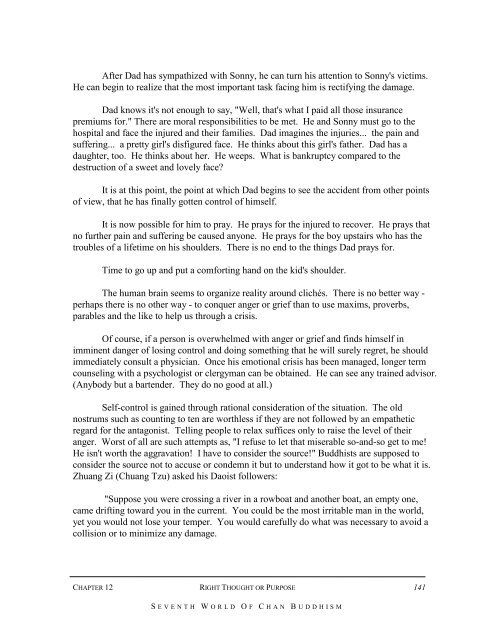seventh world of chan buddhism - Zen Buddhist Order of Hsu Yun
seventh world of chan buddhism - Zen Buddhist Order of Hsu Yun
seventh world of chan buddhism - Zen Buddhist Order of Hsu Yun
You also want an ePaper? Increase the reach of your titles
YUMPU automatically turns print PDFs into web optimized ePapers that Google loves.
After Dad has sympathized with Sonny, he can turn his attention to Sonny's victims.<br />
He can begin to realize that the most important task facing him is rectifying the damage.<br />
Dad knows it's not enough to say, "Well, that's what I paid all those insurance<br />
premiums for." There are moral responsibilities to be met. He and Sonny must go to the<br />
hospital and face the injured and their families. Dad imagines the injuries... the pain and<br />
suffering... a pretty girl's disfigured face. He thinks about this girl's father. Dad has a<br />
daughter, too. He thinks about her. He weeps. What is bankruptcy compared to the<br />
destruction <strong>of</strong> a sweet and lovely face?<br />
It is at this point, the point at which Dad begins to see the accident from other points<br />
<strong>of</strong> view, that he has finally gotten control <strong>of</strong> himself.<br />
It is now possible for him to pray. He prays for the injured to recover. He prays that<br />
no further pain and suffering be caused anyone. He prays for the boy upstairs who has the<br />
troubles <strong>of</strong> a lifetime on his shoulders. There is no end to the things Dad prays for.<br />
Time to go up and put a comforting hand on the kid's shoulder.<br />
The human brain seems to organize reality around clichés. There is no better way -<br />
perhaps there is no other way - to conquer anger or grief than to use maxims, proverbs,<br />
parables and the like to help us through a crisis.<br />
Of course, if a person is overwhelmed with anger or grief and finds himself in<br />
imminent danger <strong>of</strong> losing control and doing something that he will surely regret, he should<br />
immediately consult a physician. Once his emotional crisis has been managed, longer term<br />
counseling with a psychologist or clergyman can be obtained. He can see any trained advisor.<br />
(Anybody but a bartender. They do no good at all.)<br />
Self-control is gained through rational consideration <strong>of</strong> the situation. The old<br />
nostrums such as counting to ten are worthless if they are not followed by an empathetic<br />
regard for the antagonist. Telling people to relax suffices only to raise the level <strong>of</strong> their<br />
anger. Worst <strong>of</strong> all are such attempts as, "I refuse to let that miserable so-and-so get to me!<br />
He isn't worth the aggravation! I have to consider the source!" <strong>Buddhist</strong>s are supposed to<br />
consider the source not to accuse or condemn it but to understand how it got to be what it is.<br />
Zhuang Zi (Chuang Tzu) asked his Daoist followers:<br />
"Suppose you were crossing a river in a rowboat and another boat, an empty one,<br />
came drifting toward you in the current. You could be the most irritable man in the <strong>world</strong>,<br />
yet you would not lose your temper. You would carefully do what was necessary to avoid a<br />
collision or to minimize any damage.<br />
CHAPTER 12 RIGHT THOUGHT OR PURPOSE<br />
S EVENTH W ORLD O F C HAN B UDDHISM<br />
141


